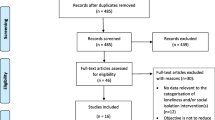Conclusions
Community treatment for seriously mentally ill individuals fits well into the philosophy of community psychology. Community psychologists have skills and experiences with other populations that represent assets in improving the ACT service model and producing richer and more useful research results for the future. Maybe we should ask ourselves why community psychologists have obviously avoided this intervention area and the population of seriously mentally ill individuals. Does this represent an adolescent reaction to the parent discipline — clinical psychology? Is the label “mentally ill” as stigmatizing to community psychologists as it is to the general population? Are these individuals written off as not worthy of or capable of benefiting from preventive interventions? Advocates for the seriously mentally ill are mounting a backlash against prevention services. We would be well advised at this time to become involved in community treatment and demonstrate that community psychology is forall vulnerable and at-risk population groups. If the truth of the matter is that “community psychology is not doing much of a job of empowering people” (Berkowitz, 1990), maybe the truth of the matter is also that we need to reach out to more disenfranchised populations with research to show that community psychologycan do the job of empowering some.
Similar content being viewed by others
References
Bachrach, L. L. (1988). The chronic patient: On exporting and importing model programs.Hospital and Community Psychiatry, 39, 1257–1258.
Berkowitz, B. (1990). Who is being empowered?Community Psychologist, 23, 10–11.
Bond, G. R., Miller, L. D., Krumwied, R. D., & Ward, R. S. (1988). Assertive case management in three CMHC's: A controlled study.Hospital and Community Psychiatry, 39, 411–418.
Bond, G. R., Witheridge, T. F., Dincin, J., Wasmer, D., Webb, J. & De Graaf-Kaser, R. (1990). Assertive community treatment for frequent users of psychiatric hospitals in a large city. A controlled study.American Journal of Community Psychology, 18, 865–891.
Diamond, R. J., & Wikler, D. I. (1985). Ethical problems in community treatment of the chronically mentally ill. InNew directions in mental health services (No. 26, pp. 85–93). San Francisco, Jossey-Bass.
Earls, M., & Nelson, G. (1988). The relationship between long-term psychiatric clients' psychological well-being and their perceptions of housing and social support.American Journal of Community Psychology, 16, 279–293.
Field, G., Allness, D., & Knoedler, W. H. (1980). The application of the Training in Community Living Program to rural areas.Journal of Community Psychology, 8, 9–15.
Gonzales, L. R., Kelly, J. G., Mowbray, C. T., Hays, R. B., & Snowdon, L. R. (in press). Community mental health. In M. Hersen, A. E. Kazdin, & A. S. Bellack (Eds.),The clinical psychology handbook. New York: Pergamon.
Mosher, L. R., & Burti, L. (1989).Community mental health: Principles and practice (pp. 323–346). New York: Norton.
Mowbray, C. T., Chamberlain, P. J., Jennings, M., & Reed, C. (1988). Consumer-run mental health services: Results from five demonstration projects.Community Mental Health Journal, 24, 151–156.
Mowbray, C. T., & Freddolino, P. P. (1986). Consulting to implement nontraditional community programs for the long-term mentally disabled.Administration in Mental Health, 14, 122–134.
Mowbray, C. T., & Herman, S. E. (1991). Using multiple sites in mental health evaluation: Focus on program theory and implementation issues. In R. S. Turpin & J. M. Sinacore (Eds.),Multisite program evaluation: The challenges and advantages.New directions in evaluation (No. 39). San Francisco: Jossey Bass.
Mulder, R. (1985).Evaluation of the Harbinger program, 1982–1985. Lansing: Michigan Department of Mental Health.
Olfson, M. (1990). Assertive community treatment: An evaluation of the experimental evidence.Hospital and Community Psychiatry, 41, 634–641.
Stein, L. I. (1990). Comments by Leonard Stein.Hospital and Community Psychiatry, 41, 649–651.
Taube, C. A., Morlock, L., Burns, B. J., & Santos, A. B. (1990). New directions in research on assertive community treatment.Hospital and Community Psychiatry, 41, 642–647.
Thompson, K. S., Griffith, E. E. H., & Leaf, P. J. (1990). A historical review of the Madison model of community care.Hospital and Community Psychiatry, 41, 625–633.
The views of the Executive Board of the Council of Community Psychology Program Directors. (1990).Community Psychologist, 23, 40–42.
Author information
Authors and Affiliations
Rights and permissions
About this article
Cite this article
Mowbray, C.T. Community treatment for the seriously mentally ill: Is this community psychology?. Am J Commun Psychol 18, 893–902 (1990). https://doi.org/10.1007/BF00938069
Issue Date:
DOI: https://doi.org/10.1007/BF00938069




